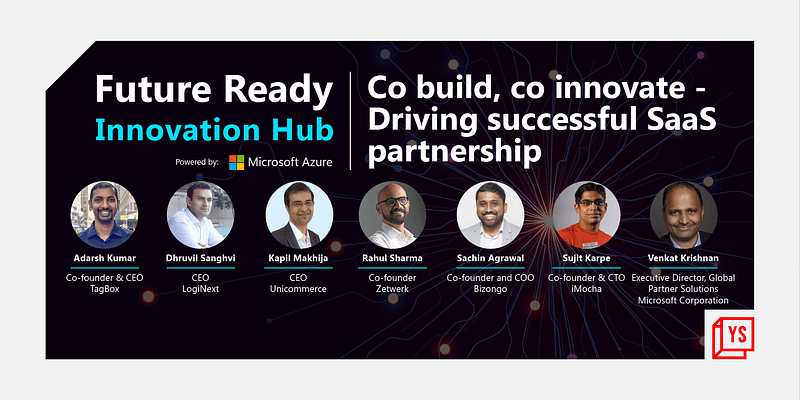
Microsoft Azure
View Brand PublisherExperts weigh in on the elements, tech, and mindset required to take India’s SaaS industry to the next level
Founders and CEOs discussed the evolving and growing SaaS industry in India, and the opportunities it presents for the ecosystem players at a roundtable discussion hosted by Microsoft.
With many software-as-a-service (SaaS) companies turning into unicorns, the Indian SaaS enterprises could be unlocking a $1 trillion opportunity by 2030. While catering to a customer base of approximately 2 billion, Indian SaaS is accelerating the economy, opening up more employment avenues, bringing in foreign exchange revenue, and more.
To discuss how companies can build and grow their SaaS business further, Microsoft and YourStory co-curated a roundtable discussion titled ‘Co build, co innovate - Driving successful SaaS partnership’ with Adarsh Kumar, Co-founder and CEO, ; Dhruvil Sanghvi, CEO, ; Rahul Sharma, Co-founder, ; Kapil Makhija, CEO, ; Sachin Agrawal, Co-founder and COO, ; Sujit Karpe, Co-founder and CTO, ; and Venkat Krishnan, Executive Director, Global Partner Solutions, Microsoft Corporation.
Success mantras
“The companies will be able to identify very specific needs and then very quickly innovate and get a product out in the market, those are the companies that will win,” said Tagbox’s Adarsh .
In addition to identifying specific problems, Dhruvil spoke about having the right go-to-market strategy. “India always had engineering talent. The country is now building product talent. In the next few years, India is going to start building on the go-to-market talent; and companies that’ll successfully be able to build those strategies and execute them will be the winners of tomorrow,” he added.
Speaking from the perspective of the B2B industry, Zetwerk’s Rahul said, “In India, most SMEs require some hand-holding to come on the digital SaaS platform. That’s how the B2B landscape will evolve from a service to SaaS… [They will have to be encouraged] to start adopting newer softwares without any hand-holding or services. In India, the labour is cheap, so it’s more about providing services. So they will have to be incentivised to come online.”
Building on Rahul’s take, Sachin reiterated the importance of reaching out to SMEs. “We need to start enabling SMEs, MSMEs, people who have access to digital solutions but are still to truly adopt them. Digital adoption has to become more inclusive, and then we have to integrate them into the existing digital ecosystem. This is required to drive efficiency and impact that SaaS is capable of,” he added.
“For a B2B SaaS company, earning a dollar is much easier than earning a rupee,” said iMocha’s Sujit. “We need to learn the art of go-to-market (GTM). The earlier go-to-market [strategy] you have, the better are your partnership strategies. Chances of both scaling and success are much higher,” he added.
Kapil spoke about the importance of staying relevant in the business and forging partnerships. He shared, “A lot of SaaS startups don’t invest much on the partnership front. Microsoft is a classic example. They have built a great partner ecosystem and have proven how to build a scalable business out of partnerships. So, startups in their initial stages should definitely focus on building GTM as well as product partnerships because that’ll make the offering scalable and a lot more exciting for the overall ecosystem.”
Building a partner ecosystem
Microsoft Corporation’s Venkat highlighted Microsoft’s partner ecosystem wherein the company has a digital marketplace that provides 4 million leads every month. “The investment we make in the partner ecosystem is to build the capacity to service customers and capabilities on key technologies to drive the digital initiatives that our customers want… We have seen that most SaaS solutions get picked up by the customers and that takes away operational overheads for the customers which then helps them to focus on business needs and priorities,” he said.
“Our belief is that every business process will be collaborative, it will be powered by data and artificial intelligence, and there will be a need to bridge the digital and fiscal worlds. Hence, from an overall SaaS perspective, we believe that India will become a global SaaS destination … The beauty of SaaS is that the world is a market,” added Venkat, signing off.
Watch the discussion here: https://ys-events.yourstory.com/future-ready-innovation-hub/home#Roundtables
To know more about how Microsoft can help in your Startup Journey please visit Microsoft for Startups program






